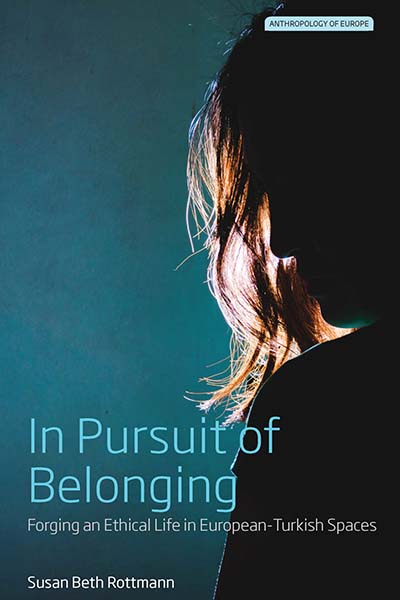Connecting German-Turkish and Syrian-Turkish Stories
By SUSAN BETH ROTTMANN, Özyeğin University

As my new book on German-Turkish return migrants, In Pursuit of Belonging (2019), is hitting shelves, I am researching Syrian migration to Turkey and Europe as part of an EU Horizon 2020 grant. The grant, called RESPOND-Multilevel Governance of Mass Migration in Europe and Beyond, is interested in refugee points of view about border crossing, reception, protection and integration. Although the migration contexts are different, I have been struck by the similarities between the experiences of Turks returning to Turkey and Syrian refugees in Turkey. There are resemblances relating to gender norms and cultural values, as well as more generally in terms of the way migration brings new perspectives.
In Pursuit of Belonging (2019) looks at relationships in workplaces and families and among neighbors and citizens, and traces specific struggles—ethical projects—with regards to education, gender and Islam. It explores these struggles by focusing on the life story of one second generation German-Turkish woman named Leyla. Readers follow Leyla as she travels from Germany to Turkey, marries, raises five children, works in illegal German-Turkish call centers and overcomes personal traumas and neighbors’ condemnation to become a community leader. What makes her story especially interesting is that she wrote it as a memoir as I simultaneously wrote it as an ethnography (the memoir is included as an appendix to my text). Thus, we see how a life may be collaboratively written and the shared and divergent meanings that an anthropologist and a “regular” person, a memoirist, give to events. Her life story is simultaneously unique and universal, singular and relatable—like everyone’s life story. Leyla is a mother with a loving spirit and hardworking character who has struggled against pain and shame to live a life that makes her proud and to inspire others.
When I compare Leyla’s story to the stories of Syrian refugees that I met, a good comparison can be found in the story of forty-one-year-old mother of four, Eman. Like Leyla, Eman, was subject to family violence and was not able to complete high school. In Leyla’s case, violence came from an abusive father and her being whisked out of high school in her senior year was due to her family’s brusque decision to send her back to Turkey from Germany without prior warning. In her words, “Who could understand us? What did ‘father; mean to us? Look at the father! Look at the father we had! Inflicting unimaginable suffering on his children” (74). Eman’s husband beat her, and she was unable to complete high school because she says her family did not value girls’ education. She explained her decision to divorce as follows: “He hit me many times. I started shouting. The neighbours heard our voices. The police came. He started crying, and saying to me ‘please don’t tell them that I hit you. Please tell them that I am your brother, not your husband.’ I told them, ‘There is nothing wrong. Everything is fine with me. He didn’t hit me.’ After the police left, I kept away from him. I didn’t speak with him, and more problems developed between us.” Finally, she took the difficult step of divorcing, leaving her alone in a foreign country with no financial support. While the details of Leyla and Eman’s circumstances are different, both were forced to leave their homes and both experienced family violence but were not defeated by it. Both come from contexts where women’s education is under-valued and contexts in which family wishes frequently supersede individual desires.
For both women, ethical mothering and educating their children were among their most significant values, despite their own deprived childhoods. Leyla explained that her “biggest accomplishment in life” is raising her children as a single mother while her husband is abroad most of the year driving trucks in Europe, and she plans for her children to “continue their education as far as possible” (185). Eman is divorced from her abusive husband, and claims, “I gave my children the best education and always helped them and asked them to get top grades.” One question to be explored further is the extent to which being a “good mother” and being “educated” have similar meanings for Turks and Syrians, but my preliminary answer is that there are indeed many similarities.
The contexts of Leyla’s and Eman’s migrations are quite different as Leyla travelled to Germany as a child of guest workers while Eman fled to Turkey as an adult war refugee. Nevertheless, migration has contributed positively to their ability to create new lives and new selves. Leyla constantly urges friends to be strong and to trust themselves. She writes in her memoir, “No matter what life has brought me, I try to see the glass as half full. We are human, and we are flawed. No matter what we will keep making mistakes. I try not to hurt others and from now on, I am not going to let other people hurt me either. I will strive to lead a peaceful and fulfilling life with my husband and children. Despite the bleeding wounds within my soul, I SUCCEEDED” (167). Eman appreciates the freedom she feels in Turkey despite the extreme financial difficulties she faces even today. She explained, “I am not afraid of anybody, just Allah. I always teach my children and my close friends: ‘You are strong. Don’t be afraid of anyone! Just be strong, and don’t be afraid of anyone except Allah.’” Both Leyla and Eman have a lot to teach us about success and strength and about how to create a good life even when you get a rough start and have a tough road to travel.
In Pursuit of Belonging advances arguments about ethics, migration and belonging that are relevant to all migrants, regardless of location. Despite the stark difficulties migration can bring, I argue that the experience creates opportunities to think and act differently. These opportunities emerge because movement prompts a need to (re)negotiate the ethics of relationships, which are the structures of belonging. While Leyla and Eman’s struggles are specific to their particular contexts, the premise that “migration prompts ethical change” is one that has universal relevance. I can even relate to this personally having lived in Turkey for eleven years. Although the projects of my life are quite different from theirs, I similarly find myself engaging effectively with two cultures but also feeling adrift and occasionally misunderstood. As I reflect towards the end of the book, “Modern life is sometimes characterized as a state of homelessness. Instead of belonging, many of us feel unmoored from roots (e.g. Rapport and Dawson 1999; Said 1984 [2001]: 159–160). For this reason, the concept of migration has deep significance. Migration becomes a mechanism for theorizing how identity itself is predicated on movement or loss (Ahmed 1999: 332)” (167). Migration stories like Leyla’s and Eman’s are thus not only instructive about their specific social contexts, but about all of our lives as well.
About the author
Susan Beth Rottmann is an Assistant Professor in the Social Sciences Faculty at Özyeğin University where she is researching forced migration in Europe and Turkey.
About the book
IN PURSUIT OF BELONGING
Forging an Ethical Life in European-Turkish Spaces
Susan Beth Rottmann
Vol. 4, Anthropology of Europe
Belonging is a not a state that we achieve, but a struggle that we wage. The struggle for belonging is more difficult if one is returning to a homeland after many years abroad. In Pursuit of Belonging is an ethnography of Turkish migrants’ struggle for understanding, intimacy and appreciation when they return from Germany to their Turkish homeland. Drawing on an established tradition of life story writing in anthropology, Rottmann conveys the struggle to forge an ethical life by relating the experiences of a second-generation German-Turkish woman named Leyla.

